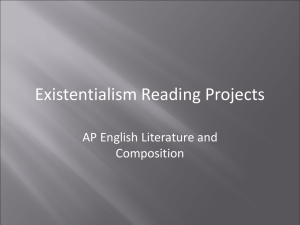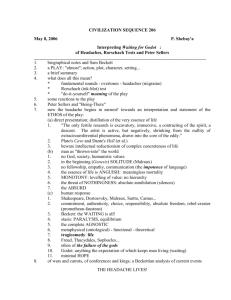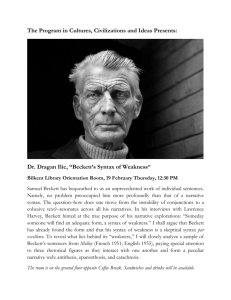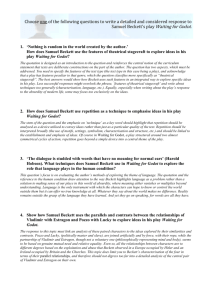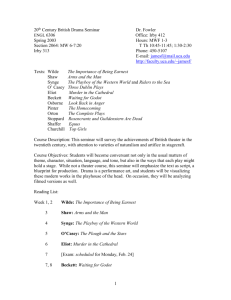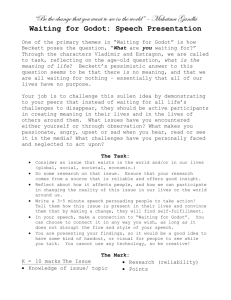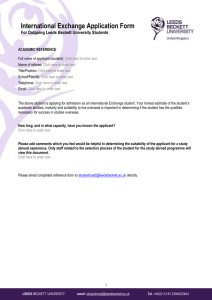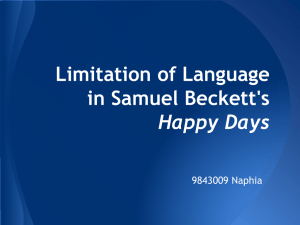here - Virgin Media
advertisement
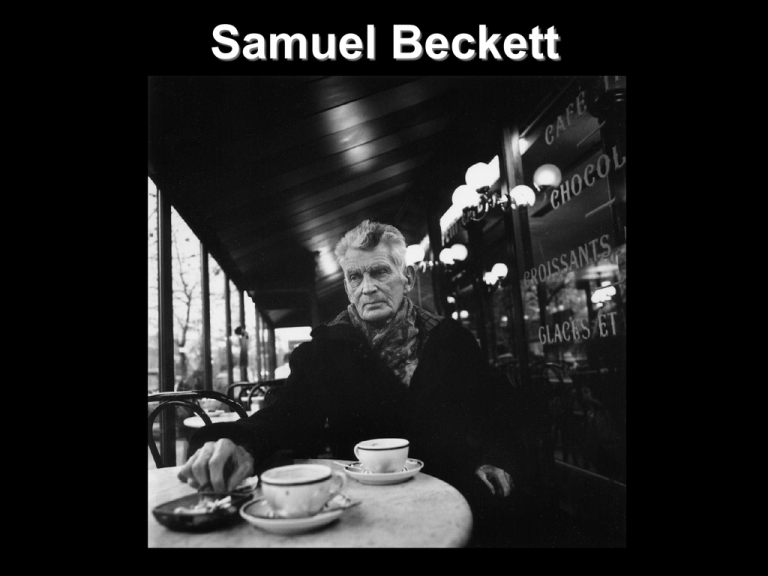
Samuel Beckett Biography • Born 13 April, 1906, in Foxrock, near Dublin. • 1923-1927: Attended Trinity College, Dublin, studying Modern Languages (French & Italian) graduating with BA first class, and was awarded the gold medal. • 1927-28: worked as a teacher of French & English at Campbell College, Belfast. Followed by École Normale Supérieure in Paris, as Lecteur d’anglais. • 1929: publishes his first essay (‘Dante… Bruno. Vico… Joyce’) and his first short story (‘Assumption’) in the émigré magazine transition. • 1930: Debut writing of ‘Whoroscope’. Beckett’s first and only critical study of any substantial length, which won a £10 prize from Hours Press. • 1938: Stabbed on street in Paris, suffering perforated lung. Was visited by pianist, Suzanne Dumesnil, who later became his wife. • 1946: began his most creative period, writing in French, with Mercier et Camier (novel) and Nouvelles. • 1955: produced Waiting for Godot – most renowned piece. • 1961: World premier for Happy Days • 1969: awarded Nobel prize for literature, 23 October. • 1970: Lessness premiered in London, and Not I premiered in New York. • 1989: Beckett’s wife Suzzanne died in July. • 1989: Last book printed was Stirrling Still. • Died December 22, following respiritory problems. • Is rumoured he give much of Nobel Prize money to needy artists. Nobel Prize • In 1969, Beckett was awarded the Nobel Prize for Literature “for his writing, which, in new forms for the novel and drama, in the destitution of modern man acquires it’s elevation.” • His wife Suzanne, who saw that her intensely private husbajd would be saddled with fame from that point onward, called the prize a “catastrophe”. • He accepted the award but refused to attend the prize giving ceremony in Stockholm. • While he did not devote much time to interviews, he would still sometimes personally meet the artists, scholars, and admirers who sought him out in the anonymous lobby of Paris Hotel PLM, which was near his Montparnasse home. Modernism • Beckett was part of the literary movement called Modernism. • Modernism is a series of reforming cultural movements in art, architecture, literature and applied arts which emerged in the three decades before 1914. • Beckett’s work represents the most sustained attack on the realist tradition. • He opened up the possibility of drama and fiction that gets rid of the conventional plot and the ideas of time and place in order to focus on the essential components of the human experience. • His work is stark, minimalist and deeply pessimistic according to some critics about the understanding of being a human. Theatre of Absurd • Named by critic Martin Esslin, after title of his 1962 book of same subject. • Movement designated for plays written by mostly European playwrights in late 1940s/50s/60s, along with the style of theatre evolved from their work. • Originates from Dadaism, nonsense poetry and avant-garde art. • The FIVE defining playwrights of this movement are: Eugene Ionesco, Jean Genet, Arthur Adamov, Harold Pinter, and Samuel Beckett. • Members of the group were not always entirely comfortable with the term, and often refered to themselves as ‘Anti-theatre’ or ‘New Theatre. • Most Famous and controversial absurdist play is Waiting for Godot, by Samuel Beckett. • Absurd Theatre is intended to shock the audience. Bibliography: Theatre • • • • • • • • • • • • • • • 1940: Eleuthéria 1952: Waiting for Godot 1956: Act Without Words I & II 1957: Endgame 1958: Krapp’s Last Tape 1960: Happy Days 1963: Play 1965: Come and Go 1972: Not I 1975: That Time 1975: Footfalls 1981: Rockaby 1981: Ohio Impromptu 1982: Castastrophe 1983: What Where Waiting for Godot • • • • • • ‘En Attendant Godot’ – French, written in 1949, and published in English in 1954. Was the break for Beckett that brought him international fame across the globe, and became established as a leading figure in the Theatre of the Absurd movement. It is a Tragi-comedy in two acts, and first opened at Theatre de Babylone, on 5th January, 1953, and made history. The story follows two tramps, Vladmir and Estragon, who meet near a tree on a country road. They await the arrival of a man called Godot, and so to pass the time they joke, reminisce, eat, and even contemplate suicide, It soon appears Godot arrival is never to happen, so the play ends with no meaning or specific event that has occurred. Reflects life – waiting, killing time and clinging to the hope that relief may be just around the corner, if not today then perhaps tomorrow. Happy Days • • • • • • • During the 15 years after the war, Beckett produced 4 major full-length plays, one being Happy Days. He began the play on the 8th Oct 1960 and finished the play in may 1961. The 1st production was at The Cherry Lane Theatre, New York on the 17th Sept 1961. Happy Days is about a woman named Winnie who is trapped to her waist and then to her neck in the ground, with her husband Willie her only companion. The dirt is thought to be a metaphor for the human condition. Like Winnie we are all moving slowly towards our deaths with only our daily routines to distract us from the despair and the need to end our lives early. This play is about a woman who spends her life focusing on her everyday activities such as brushing her hair, praying and sorting out the objects she keeps with her in her bag in order to help get her through the day. This play shows the strength of the human spirit, the trap of existence and the limited nature of communication. Happy Days incorporates powerful themes such as expectation, companionship , abuse and hope. Rockaby • • • Written in 1980, it is a short, one woman play; in which she is surrounded by no props or scenery, dressed in an evening dress, and in a wooden rocking chair that stops and starts of it’s own accord, to a pre-recorded voice (her own) playing, recounting details of her life. The play was premiered on April 8, 1980 at the state University of New York at Buffalo, directed by Alan Schneider and starring Billie Whitlaw. Throughout the play, the woman joins in with the lines “time she stopped”, “living soul” and “rock her off” by demanding “more” each time a little softer than before. At the end, the woman fails to join in with the voice, the rocking ceases and the woman’s head slowly indicates; “she has apparently died”. Famous Quotes “We were all born mad. Some remain so.” - Waiting for Godot “… this place, if I could describe this place, portray it, I’ve tried, I feel no place, no place around me, there’s mend to me, I don’t know what it is, it isn’t flesh, it doesn’t end, it’s like air…” - The Unnamable “You were saying something nice about me, I can feel it.” - Eleuthéria “With diminished concentration, loss of memory, obscured intelligence… the more chance there is for saying something closest to what one really is. Even though everything seems inexpressible, there remains the need to express. A child need to make a sand castle even though it makes no sense. In old age, with only a few grains of sand, one has the greatest possibility.” - Samuel Beckett, at the age of seventy-six. The Oxford Samuel Beckett Theatre Trust Award Prize • In spring of 1967, Francis Warner, fellow and tutor in English Literature at St Peters College, Oxford, had idea of founding a theatre in Oxford, which would be a foundation for all new writers/musicians/artists/performers/directors of avant-garde, the aim being for them to produce new and experimental work. • During the Summer of 1967, Warner personally asked Samuel Beckett if the theatre could be given his name. He was happy to oblige. • 1976 – The college passes the management process to allow access to set up a charitable trust, dedicated to encouraging new generations of creative artists . • The Trust Award was set up in 2003, and the purpose of the award is, to help the development of emerging practitioners with experimental theatre. The Samuel Beckett Theatre • The Samuel Beckett Theatre was opened in 1992 to celebrate the quatercentenary of Trinity College, Dublin. • It is the campus theatre of the Universities Department of Drama. During University term it showcases the work of the Department and it’s courses, while outside term it hosts visits from some of the most prestigious dance and theatre companies from Ireland, Europe, Japan and the United States. • Regular events taking place there are the Dublin Fringe Festival, International Dance Festival Ireland, the Dublin Theatre Festival, and an on-going series of lectures by practitioners and scholars called Contemporary Theatre in context. Influences • James Joyce: He was an Irish expatriate writer, widely considered to be one of the most influential writers of the 20th century. • William Butler Yeats: He was an Irish poet and dramatist; foremost figures of the 20th century literature. • Dante Alighieri: He was an Italian poet from Florence; his central work, the Commedia, is considered the greatest literary work composed in the Italian language and a masterpiece of world literature. • People he met whist travelling through Europe, give him ideas which would later translate into some of his finest characters. Influence on Others • Beckett influenced writers like Václay Havel, John Banville, Aidan Higgins and Harold Pinter which have all stated their indebtness to Beckett. • He had a wider influence on experimental writing between the 1950’s and the 1960’s. He had great influence on poets such as Derek Mahon, Thomas Kinsella as well as writers like Trevor Joyce. • Many major 20th Century composers including Luciano Berio, Philip Glass and Pascal Dusapin have created musical works based on Beckett’s texts. • He influenced many visual artists like Bruce Nauman and Alexander Arotin. • Beckett is considered to be one of the most prized of twentieth century authors. People’s Views - “If you believe that Beckett is pessimistic, then you are a Beckett character trapped in a Beckett play; Beckett was not saying “no” because he wanted to, but because he was searching for the yes.” Peter Brook, The Empty Space “Samuel Beckett is sui generis… He has given a voice to the decrepit and maimed and inarticulate, men and women at the end of their tether, past pose or pretense, past claim of meaningful existence. He seems to say that only there and then, as metabolism lowers, amid God’s paucity, not his plenty, can the core of the human condition be approached… Yet his musical cadences, his wrought and precise sentences, cannot help but stave off the void… Like salamander we survive in his fire.” - Richard Ellman
